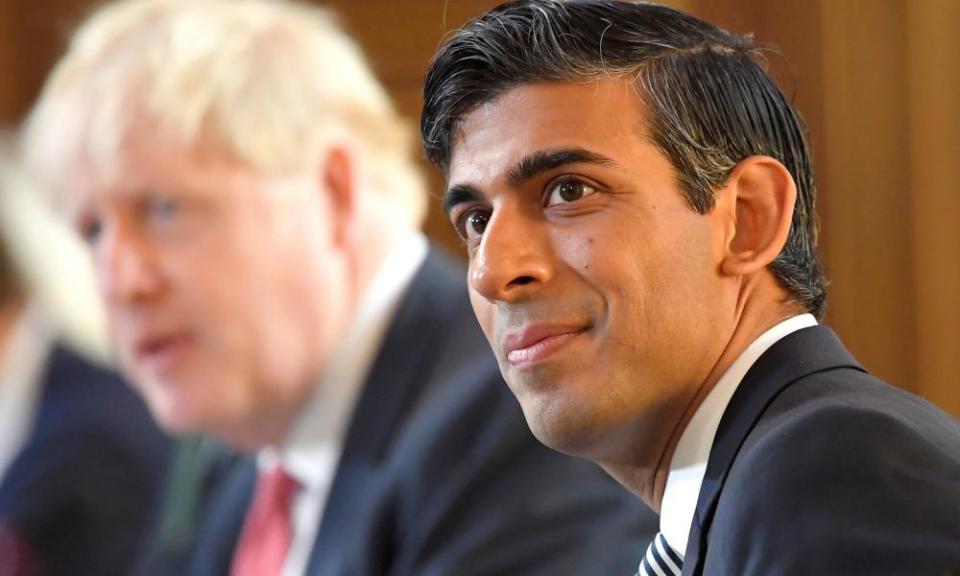Rishi Sunak needs to urgently rethink his plans to get UK through winter

Rishi Sunak’s “winter economic plan” is urgently needed. It certainly could not have waited until November’s budget, now scrapped. Just look at the latest news on business activity: the recovery was starting to stall even before this week’s new Covid restrictions arrived. Over in the eurozone, which has been about a month ahead of the UK throughout the crisis, data is even weaker.
The chancellor has still left it late to act. The sugar rush of “eat out to help out” passed at the end of August. Companies that were hauling workers back to offices are reversing their plans. And the furlough scheme, still supporting 3 million jobs, is supposed to close five weeks from now.
Sunak, once again, needs to go big. The Treasury’s reluctance to extend the furlough scheme was predicated on the idea that a second lockdown would not be required and that the economy should start to adapt to new conditions.
That hopeful thesis has now been squashed. We’re not in full lockdown but 10pm curfews on pubs and restaurants represents a huge setback for the hospitality sector. Companies that found a way to cope through the spring and summer are low on financial resources and ideas. The cliff edge beckons for redundancies.
A German-style wage subsidy scheme, as Sunak is said to be considering, would be one way to overcome the hesitation about repeating the furlough operation in full. But the apparent reluctance to design tailor-made schemes for individual sectors needs a re-think.
Yes, it’s hard to know where to draw sectoral lines, but financial support should go where it is most needed. If not, it looks as if you’ve learned nothing over the past six months. Hospitality, as the sector most affected by the new measures to slow infections, has a strong case for special help.
Sunak can pull other levers. He could extend VAT and business rate holidays to create incentives for companies to survive the winter. He could cut employers’ national insurance contributions as another way to encourage employment, the measure that counts above all at the moment. But the package need to be comprehensive. The impression that it’s being thrown together in a hurry is not encouraging.
Habgood departs Relx to little fanfare
Sir Anthony Habgood, long-serving chairman of Relx, is departing, an event that will not rank highly on every news agenda. Despite being the eleventh largest company in the FTSE 100 index – one place below BP – Relx keeps an almost comically low profile.
The chief executive, Erik Engstrom, hasn’t given an on-the-record interview to a journalist since being promoted to the top job in 2009. Even the corporate name is off-putting. It’s derived from Reed-Elsevier, as the legal and scientific publisher used to be, but requires a guide to pronunciation – two syllables: “Rel-ex.”
Habgood (after past triumphs at Whitbread and Bunzl) and Engstrom have led a quiet and consistent revolution. Revenues increase every year, but costs by slightly less. The share price has trebled since 2009, thus the climb up the FTSE ladder. The metronome may suffer a slight Covid wobble since there’s an exhibitions business, but the bigger publications side these days is firmly in the safer space of digital subscriptions.
Pearson, which used to be regarded as Relx’s UK publishing cousin, has been left completely in the shade. As recently as May 2012, the difference in stock market values between the pair was not much – a billion either side of £10bn. Valuations today: Pearson’s £4bn plays Relx’s £34bn. The divergence in fortunes is extraordinary.
Pearson’s board thinks the answer to its print-to-digital woes is to appoint a supposed ex-Disney superstar, Andy Bird, hand him a $9m signing-on bonus and let him manage the company out of the US. It is the equivalent of hitting the panic button. That’s not how Relx succeeded.
Tesla announcement fails to shock
Elon Musk takes a loose approach to deadlines – sometimes Tesla hits them, sometimes not. So one must take with a pinch of salt his prediction that the electric car company will have a $25,000 model ready within three years.
This announcement lacked the “wow” factor that Musk’s fan club seemed to be expecting. Then again, when the company is already worth $390bn, the news would have had to be truly spectacular to push the shares higher.
Take a step back, though, and a $25,000 Tesla, with better batteries and a bigger mileage range, would be a very big deal. At that point, electric is not niche.

 Yahoo Finance
Yahoo Finance 